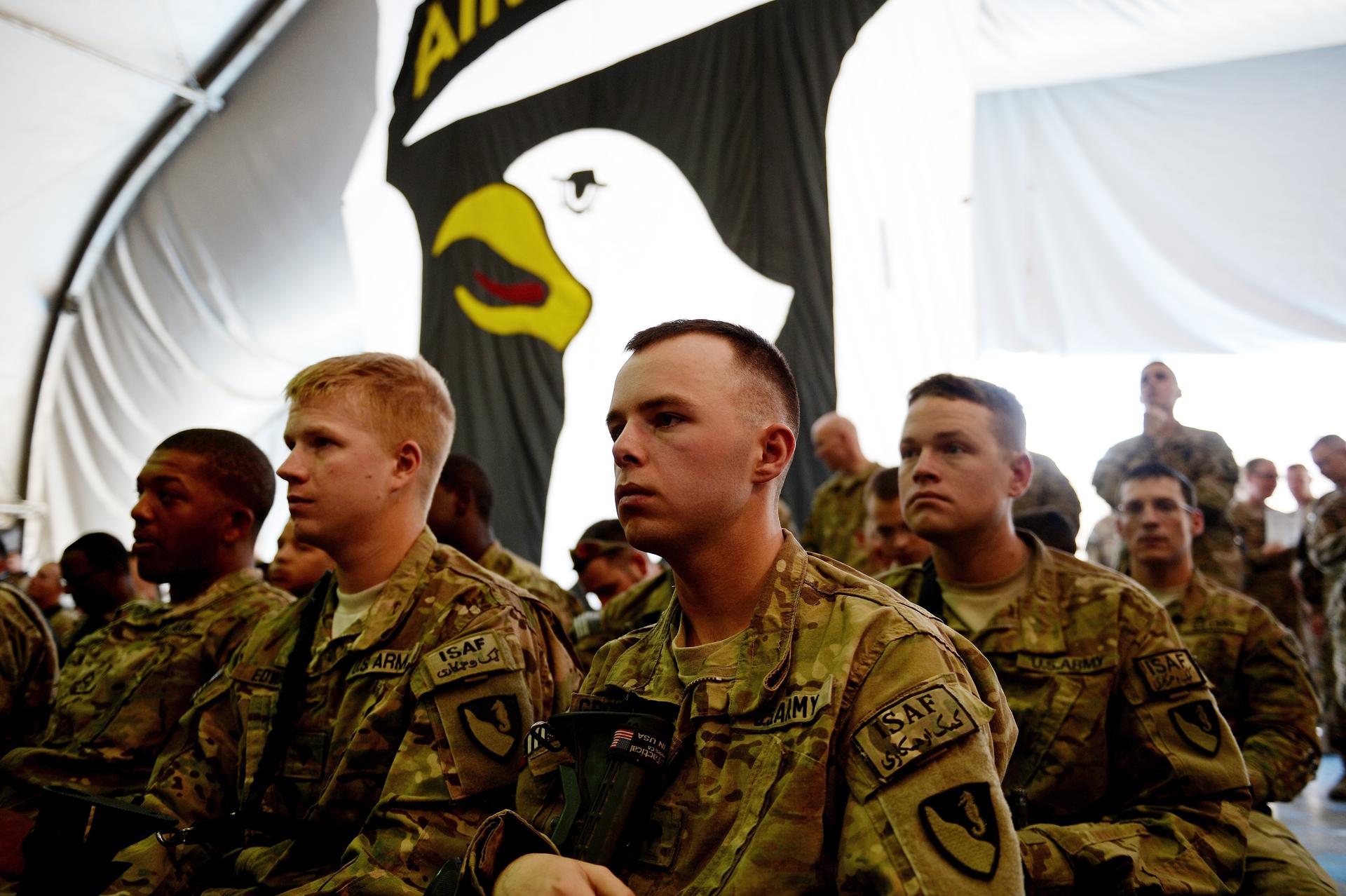Back to Afghanistan as America ends its longest war
US soldiers attend a naturalization ceremony at the US base in Bagram, north of Kabul, on July 4, 2013.
BAGRAM AIRFIELD, Afghanistan — Afghanistan knows how to welcome you back after a six-month absence.
While waiting in Dubai for my flight into Afghanistan, I learned that our plane was still stuck on the ground in Kandahar during a Taliban rocket attack, and would be delayed while the airfield was locked down.
After about four hours of waiting in the opulence of Dubai's main terminal, I was on my way. Usually, I fly into Afghanistan on regional commercial airlines, which are packed with craggy Afghan men hauling plastic sacks of dry goods home from the United Arab Emirates.
| |
(Emily Judem/GlobalPost) |
Because time was tight for my connections, this time I flew to Afghanistan on a charter jet. The flight was full of contractors employed by the military, shouldering faux-tactical backpacks, polo shirts tucked into ill-fitting jeans and expensive sneakers. A dozen banal conversations drifted through the crowd, as the men described their work sorting the military's laundry, troubleshooting internet cafe equipment on bases, signing out pickup trucks to soldiers and many other daily tasks that have become the responsibility of civilian contractors.
They droned on about the vehicle dispatch reports they are responsible for, inadequate internet speeds, petty office politics and hated supervisors in the cottage industry that has been built up around private military contractors offering their services for lucrative pay in what can be a very dangerous place to commute to work. Their puffed-up chests and awkward macho posturing seemed to suggest a workplace comedy show on the fringe of the longest war in American history.
The Office goes to war.
US Secretary of State John Kerry left Kabul last week after negotiating a bilateral security agreement with Afghan President Hamid Karzai. The agreement would allow for about 10,000 US troops to remain in Afghanistan beyond next year's withdrawal.
The agreement still needs to be approved by Afghanistan's Loya Jirga, a governing tribal council, that has expressed grave reservations about the immunity from the Afghan legal system that is granted to American troops. The White House has made it clear that if the security agreement is not completed by Oct. 31, the US will withdraw all of its troops from Afghanistan next year, as it did in Iraq when similar negotiations failed.
So the next few weeks will be a critical time in the political process of the long drawdown of troops that lies ahead. But my focus will be on the troops in the field.
The advantage of the charter flights for an embedded reporter is that they debark inside the military base you're trying to get to. That eliminates visas, shady taxi drivers, Afghan bureaucracy and occasional bribes from the equation. The disadvantages are that the flights are about twice as expensive at about $450, and that they stop for rocket attacks.
The Afghan flights carrying old Pashtun men home with their loads of goods – everything from Chinese rice cookers to used auto parts – just keep going through it all. After nearly four decades of conflict beginning with the Soviet invasion of 1979, through the bloody civil war of the 1990s and then the US-led invasion in the aftermath of 9/11, Afghanistan is a place that knows how to live with war.
Inside Bagram Airfield, you'd hardly know that there's a drawdown happening. Soldiers were busy, going about their duties in body armor because of a recent uptick in rocket attacks on the base. Helicopters roar back and forth while drones buzz overhead at regular intervals. Most tellingly, construction crews are putting up new concrete barracks and office buildings all over Bagram. Clearly, no one is planning for a complete military pullout from Afghanistan.
As I emerged from a jet-lagged haze my first day at Bagram, Afghanistan's powdery dust quickly crept deep into my lungs and the cafeteria food formed an anvil in my belly.
Tens of thousands of young men have voluntarily joined the American infantry over the past decade, desiring to fight in a war, to be a small part of a large undertaking, to measure themselves against an ancient standard of manliness. The story of their involvement here is changing, and it's important to me to be on the ground to document that change and illuminate its meaning.
And when I think about that and the next six weeks of embeds with various military units including the Afghan National Army, I feel focused and ready to get back in the field. I want to see where the counterinsurgency effort stands as this year's 'fighting season’ winds down, before the US officially draws down troops in earnest in the spring and continuing through the autumn of 2014.
It's good to be back.
GlobalPost’s Ben Brody is in Afghanistan as part of a year-long reporting and photography project to document the drawdown of US troops. The GlobalPost ‘Special Report’ is funded in part by The Ford Foundation.
